Could something in the water explain this bounty? Locals think so, crediting the rich volcanic soil with the Auvergne’s verdant grazing meadows and fruit farms. Meanwhile visitors are drawn to its passionate but decidedly unpretentious food culture. Exploring blissfully quiet vineyards and meeting fourth-generation cheese makers feels like tapping into the Auvergne’s very lifeblood.
This rural part of France lends itself well to road trips, and this circuit from Clermont-Ferrand, the Auvergne’s largest city, will whet your appetite with the best produce around. To break up the trip, sleep off all those glasses of Côtes d’Auvergne on an overnight stop in Salers or Le Puy-en-Velay.
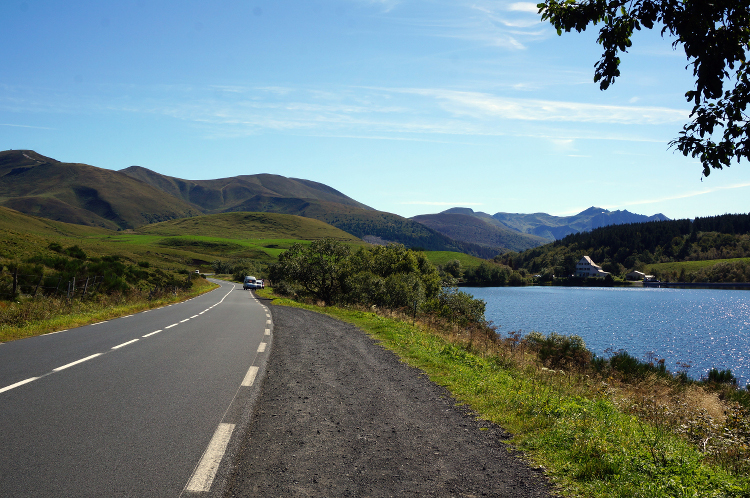
When in France, begin with cheese. Five cheeses in the Auvergne have been certified with ‘protected designation of origin’ (PDO) status, a stamp of approval that guarantees authenticity (and guards against dairy impostors). With dozens of dairy farms, you could enjoy an entire trip rolling between Auvergne cheese tastings (learn more about the cheese trail on www.auvergne-tourism.com/the-auvergne-cheese-trail).
Most famous is the bleu d’Auvergne, a creamy yet powerfully piquant blue cheese first ripened in the mid-19th century. The cheese, with its distinctive blooms of green mould, is often paired with nuts and fruit to offset its strong flavour. For first-timers, it almost seems to singe the mouth.
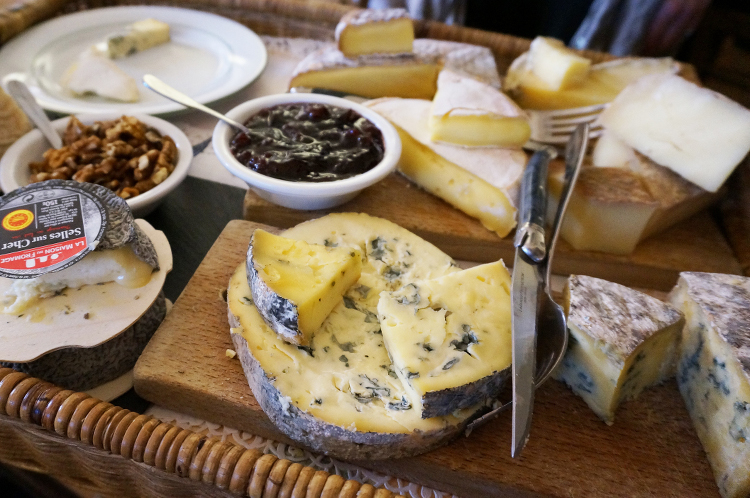
For one of the best places to buy bleu d’Auvergne, drive southwest out of Clermont-Ferrand in the direction of Orcival village. The urban din is quickly left behind, the road flanked by yawning valleys and farmland. Only minutes out of the city, where the D942 meets the D68, lies the most easily accessible lookout point over the Auvergne’s dormant lava domes, the Chaîne des Puys. Test your tyres by continuing southwest along the country roads until the turn-off to Avéze, and you’ll soon find Croix de Chazelles cheese farm . The Vergnol brothers are the latest in a line of four generations of cheese makers. As well as bleu d’Auvergne, ripened for at least four weeks, the brothers also produce mild Fourme d’Ambert cheese, a month-aged blue with less bite.
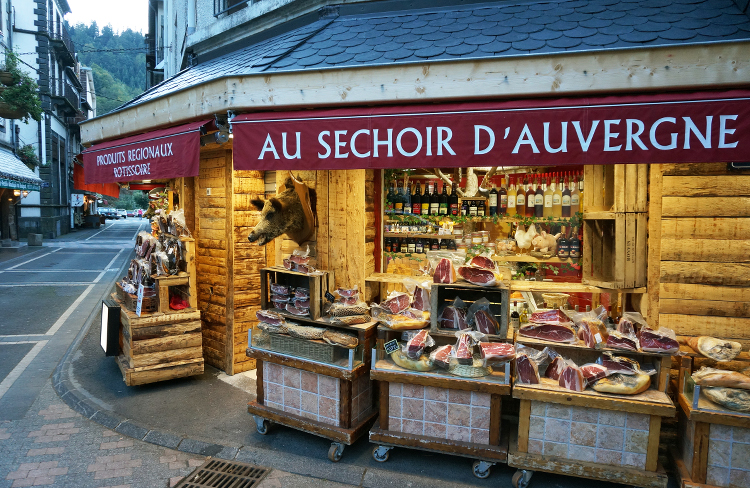
Seize your cheese and drive 19km east for lunch in Le Mont-Dore. This mountain-backed town is a hub for skiers and hikers, which means local food is wonderfully hearty. Continue the cheese theme by ordering truffade at the excellent L’Auberge des Skieurs (7 rue Montlosier). Thin slices of potato are layered with cantal (another PDO cheese) and duck fat, creating a rich flan. A side dish of charcuterie (cured meats) is essential, complete with the acid tang of cornichons (pickled miniature gherkins) to cut through the fatty flavours.
After waddling through Le Mont-Dore, perhaps pausing in a delicatessen to take home some of the Auvergne’s famous charcuterie, squeeze back into your car. Ninety minutes’ drive south brings you to Salers, home of some very hardy mountain cows and thus two of the Auvergne’s tastiest local products. Excellent restaurants spill over into Salers’ meandering alleyways; try La Diligence and Les Remparts .
A cheeky Auvergnat legend says these cattle were transformed from volcanic fireballs, giving them their distinctive reddish colour. Salers beef has pride of place on many Auvergne menus, thanks to its famously fresh and gamey flavour. Meanwhile Salers cheese is a contrast to all those powerful blues. Ripened for three months at a minimum, this hard, nutty cheese has almost fruity notes.
Surrounded by the wilds of the Parc Naturel Régional des Volcans d’Auvergne, Salers puts you in prime position for a hike to burn off the calories. The less adventurous can achieve the same effect with a gentle ramble through this medieval village’s cobblestoned streets.
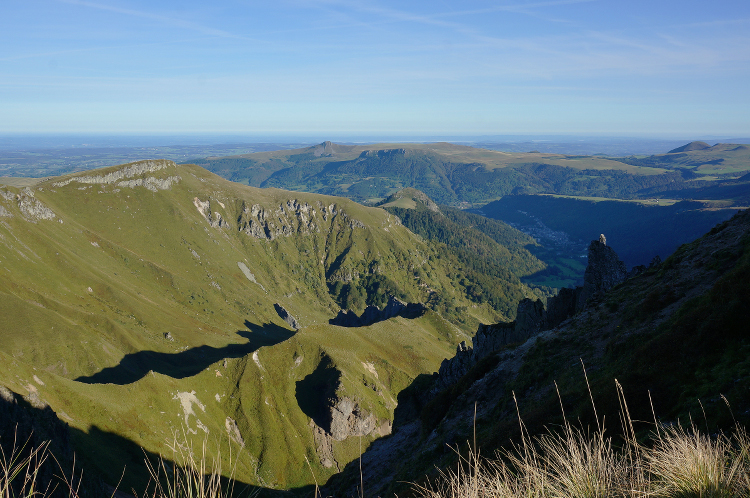
Taking the road east out of Salers, the route wends right through the parc naturel, past stone villages and meadows. Volcanic craters blanketed in green roll into the distance. A little over two hours of driving brings you to Le-Puy-en-Velay, a town remarkable for its Unesco-crowned cathedral, museums, and Chapelle St-Michel D’Aiguilhe atop a petrified volcanic plug.
But believe it or not, you’re here for the lentils. Le-Puy-en-Velay’s prized green pulses have attracted protected status. They are even dubbed the ‘caviar of lentils’. Gourmets claim it’s down to their earthy flavour and the way they retain their shape when cooked. Le Puy lentils are at their best stewed with slivers of pork, greedily absorbing the fatty flavours in recipes like petit salé aux lentilles (pork belly with lentils). Restaurants abound along Rue des Tables, but local favourites Le Chamarlenc and Le Poivrier are worth seeking out. Wash it all down with verveine du Velay, a refreshing greenish liqueur scented with verbena; alternatively have a sip of this local speciality at the dedicated Maison Verveine du Velay.
Centuries of wine production in the Auvergne were brought to a halt in the 19th century when vine aphids ruined crops across the region. Wine-growing villages emptied, caves à vin (wine cellars) went out of business, and it has only seen a return to form in recent decades.
From Le Puy-en-Velay, point your car back towards Clermont-Ferrand. Before you reach the city, after 90 minutes’ driving, pause at Cave Saint Verny to sniff, sip and – luggage weight permitting – stock up on local wines. This epic winery is well stocked with white, red and rosé Côtes d'Auvergne, as well as sparkling wines and effervescent mixed drinks flavoured with bilberries.
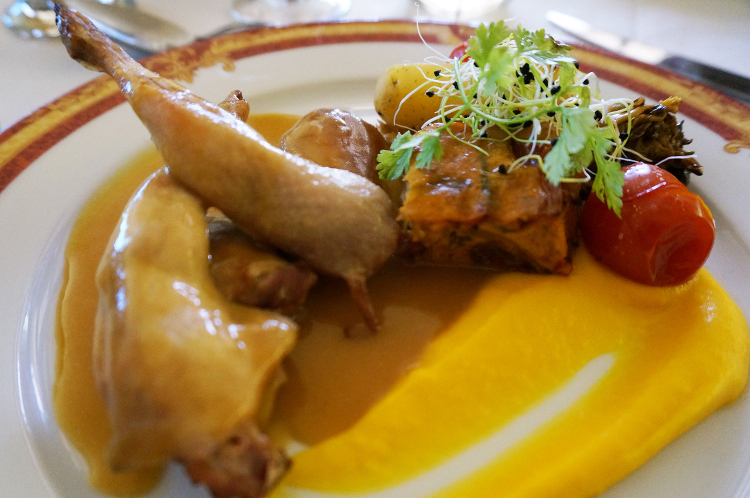
It is fitting to leave the Auvergne with its most inventive flavours lingering on your lips. A worthy detour before returning to Clermont-Ferrand is the village of Glaine-Montaigut, for the excellent Auberge de la Forge . The Auberge is part of a budding crop of restaurants lifting the Auvergne’s traditional flavours into creative new recipes. Pork glazed in honey and green pepper, or goat’s cheese floating on beetroot coulis, offer alternatives to Auvergnat stews and flans. And they’re light enough to leave you just hungry enough for a return visit.